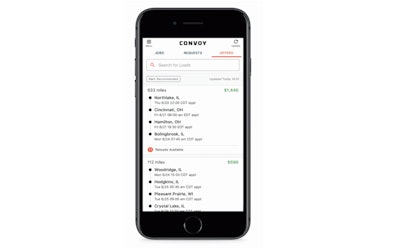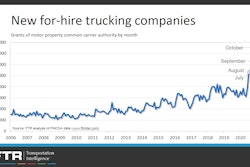
In a year that’s seen per-mile freight rates crash to paltry levels and then boom to record highs in a six-month span, some prominent digital freight brokers have said they’re instituting programs to try to sheer the extremes of the market volatility and, in doing so, provide more dedicated freight options to independent owner-operators.
Digital brokerage Convoy‘s new Guaranteed Primary program, though aimed at the company’s shipper customers, should open up more contracted freight options for owner-operators and small fleets through Convoy’s platform, says Dan Lewis, CEO and company co-founder. Guaranteed Primary is, in some ways, a hybrid take on contract freight and spot market loads. Instead of locking pricing in like a traditional contract between a shipper and carrier or broker, the program instead ties contract freight rates to what’s going on in the market.
So if rates are going up on the spot market, shippers aren’t at the whims of that increased market pressure. Likewise, when rates are trending down, Convoy, and presumably the carriers hauling loads for the company, won’t get pummeled like they did this spring.
It addresses “the natural way freight works,” said Lewis. “And it creates a model that’s sustainable and that can handle any market condition.” For example, “if rates come down significantly, often shippers will try to go to the spot market instead of giving freight to their contracted partner,” said Lewis. Under Guaranteed Primary, shippers would have less incentive to divert freight to the spot market when rates are cheaper there. Or, vice versa, if rates start spiking, carriers will be less likely to reject tenders and turn to the spot market to earn stronger rates.
Other brokers are making somewhat similar plays with increased dedicated and predictable options for truckers within their networks, including longtime broker C.H. Robinson, as reported previously here at Overdrive. Robinson’s Procure IQ system, also aimed at shippers, in a certain sense resembles Guaranteed Primary. It’s aimed at allowing a shipper’s access to rich data on Robinson’s rate performance lane by lane to introduce greater dynamism into the pricing process, informing (at the least) and potentially transforming the traditional bid process. Schneider National’s brokerage arm, too, recently launched its FreightPower connection engine for carriers aimed partially at improving the digital-connection experience for its partner independents and small fleets, introducing new paths into power-only loads within Schneider’s vast network of retail freight.
Uber Freight, meanwhile, is newly offering a “dedicated lanes” featured within its app that’s aimed at putting volatility control directly into carriers’ hands. It allows carriers to lock in pricing for a specific term on a specific lane, delivering predictability to both the carriers and the shippers on the other end. It’s a direct response to the volatility that’s plagued the markets this year and in the past, said Sagar Shah, carrier operations director. The system allows “carriers to sign up for a regular lane and commit to a regular price” for “consistent, reliable freight for them. … We launched it about a month ago.”
As with many brokers, Lewis said nearly all of Convoy’s freight is moved by fleets with fewer than 10 trucks, and the programs the company builds are intended to provide benefits to that segment of the industry. “So they can show up to the market with the same strength as larger carriers,” said Lewis.
Though Convoy since last year has offered freight contracts to owner-operators and small fleets, such as 12-week or 6-month commitments with locked in per-mile prices, Guaranteed Primary should serve to open up even more lanes and freight for dedicated hauls, Lewis said. So far, shippers seem interested in the program, he said. “We’ve added over a dozen major customers into this program just over the past month or two,” he said. The traditional contracted freight model, Lewis said, increasingly “feels like a shoe that’s the wrong size,” relative to how the freight market operates in the modern era.









